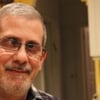My last couple of posts have focused on the educational methodology of teaching media savvy students how to examine visual evidence of the Shoah. I have recorded some of our class conversations and you must wonder: what is the atmosphere like in this classroom? Is it terribly negative considering what is being learned? Mustn't it be especially upsetting for students in a Jewish day school to learn the horrific details of the Shoah, the Holocaust, that wiped out an entire Eastern European civilization? My students find this study enlightening and are not depressed but eager to learn more and empowered by what they discover. I would like to share how this can be done. For me, this is an issue that transcends ethnicity, nationality, or religion. How are students affected by learning about genocidal attempts that strike 'close to home"? Let me begin with a story that exemplifies what Facing History is all about.
Facing History's book The Jews of Poland was inspired by Jan Darsa's research into the destruction of this civilization by the Holocaust. I feel privileged to work closely with Jan, and once asked her about the origins of this excellent resource book. Her reply was fascinating: she became interested in the Shoah when her then young daughter came home after a Holocaust Memorial Day observance in school and asked: "Mommy, if all of Jewish history is this sad, do we have to be Jewish?" This young girl had already experienced the weight of Jewish history and felt discouraged. Why shouldn't she? Jan was very upset and decided that she needed to understand why so much of Jewish history is the story of marginalization. She obtained a Jerusalem Fellowship, researched the topic, and the rest is, pardon the pun, history.
The Jews of Poland is a rich documentary volume full of important insights into the very complex relationship between Poles and Jews that developed over centuries. It is evident that the history of Jewish Polish relationships is deeply nuanced by inter-ethnic, intra-ethnic, religious, cultural, linguistic, and socio-economic issues. When properly instructed through the Facing History Holocaust and Human Behaviour Scope and Sequence strategy, students come to understand that Jews were marginalized because they were different. Since they have already encountered this theme in their curriculum, and are encouraged to make connections to other material and become "moral philosophers", they come to realize that marginalized groups can become targets of genocide. Thus, it is not ONLY Jews who are potential victims, but all those easily categorized as marginal groups in many societies. Add to this the fact that it is often economically (as in the Great Depression) or politically useful to create scapegoats--also situations covered in the course's Scope and Sequence, and the students come to realize that the Shoah is a well executed example a genocidal sequence of historical events.
In my experience this leads to two vital educational outcomes. First, students understand that genocide's creates victims in a non-random manner and the process includes many conscious choices that we can educate future generations to improve on. Second, Jews are not the only victims of genocide and being a Jew does not automatically make one a victim, nor is it the sole theme in Jewish history. Rather, Jewish students should realize that their legacy imbues them with an acute awareness of the role marginalization can play in history. They should feel and be encouraged to make common cause with other victims of discrimination and genocide and try to root out this disease among future generations.
I am very excited that, in a few weeks, I will have an opportunity to do exactly this. i will be leaving for Poland with Jan Darsa and some other Facing History Educators to link up with a fairly new Polish organization Dialogue Among the Nations which is seeking to discover why Polish-Jewish relationships were frequently so hostile and fraught with tensions. This organization is concerned with some indications of rising antisemitism in Poland and is educating teachers to combat this at the grassroots level in their classrooms. I will blog during the trip and let you learn as I do. We know the pattern of genocide; we can work to wipe it out.

